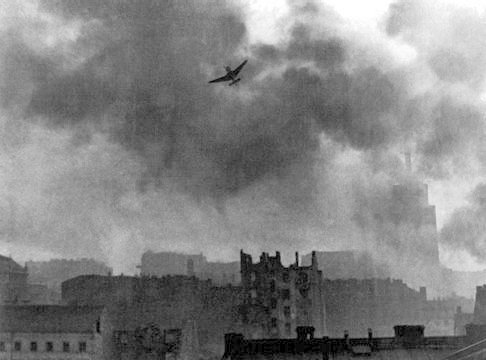A few days ago, I reported on Adam Michnik‘s haunting remarks during the Czesław Miłosz festival. He recalled a few brief months of freedom in 1981, with the heady rise of Solidarity and the Polish poet’s return to Warsaw after decades of exile:
“It was a time of euphoria, carnival – it was our victory,” he said.Miłosz was more cautious. He told Michnik, “The atmosphere feels like just before the Warsaw Uprising. Please be careful.” Tanks rolled into Warsaw and martial law was declared a few months later.
I was intrigued, but somewhat puzzled by Miłosz’s comment. I had always assumed that the days before the Warsaw Uprising were full of terror and apprehension. I chalked up Michnik’s recollection to pure prescience on Miłosz’s part.
Then, bumping along in the train between Warsaw and Vilnius, I found my answer. I ran across this passage in the new collection of essays, Proud to Be a Mammal, in a reprinted piece called simply “G.G.”
Little by little the time was drawing near for the destruction of Warsaw. The uprising was a blameworthy, lightheaded enterprise … Handfuls of people stood on street corners, watching with a quiet smile as trucks were loaded with wardrobes, mirrors, rugs – the contents of German offices and private homes. They were fleeing. No one was afraid of them anymore.
In other words, what the Polish people saw as a retreat was simply the Germans evacuating a city they knew was about to be destroyed.
The posters that had been tacked up, ordering all males to report for work on the fortifications, were received with jeers. You could already hear Russian artillery fire. Rumors of an armed uprising were greeted joyfully: a chance to throw oneself at one’s tormentors and take revenge … Soon, however, came the news that there would be no uprising. One of my Socialist colleagues told me that to take any sort of action now, when Mikołajczyk, the premier of the London government [in exile], was flying to Moscow, would be nonsense. Stalin was too clever to negotiate with anyone using such a trump card, and whoever tried to outsmart him would never be forgiven.
The military leaders (caught between two fires, because the Russian Radio broadcasts called for the taking up of arms) did not enter into such subtleties; as a result their judgment was incompetent. The command was given so suddenly that it found most of the units without weapons. …
That day, the first of August, Janka and I were walking over to Tiger’s for an after-dinner chat and a cup of tea. I had something terribly important to discuss; namely, my new translation of an English poem. On leaving for a walk one should never be too sure of returning home, not only because something may happen to one personally, but also because the house may cease to exist.
The older I get, the more uncomfortable I am with any group emotions – whether crowd hatred or crowd euphorias. And sometimes the euphorias are more blinding than the hatreds.
Tags: Adam Michnik, Czeslaw Milosz




May 26th, 2011 at 1:54 pm
You stated :
“Note to self: Must read Mickiewicz when I get back to California. Anyone know the best translations?”
New translation of Mickiewicz’s Pan Tadeusz–
http://www.leonardkress.com/Pan%20Tadeusz.pdf
(free download)
I came to your blog through Artur Rosman’s Facebook postings.
May 26th, 2011 at 3:11 pm
Thanks, Leonard. Maybe I can download it onto my Droid?
May 26th, 2011 at 5:58 pm
Hi, Cynthia, thanks for the post on Milosz and the Warsaw Rising. I’m always curious about his time during the war, and you gave me much to think about and explore further.
I see Leonard Kress’s comment above and strongly recommend his translation. Very powerful.
Finally, I thought you might be interested in seeing the video that was produced by the Warsaw Museum of the Uprising of 1944. The video recreates the look of Warsaw following the Uprising–as seen from one of the American bombers flying aid to the city.
Here’s the link: http://lightning-and-ashes.blogspot.com/2011/05/warsaw-rising-award-winning-video.html
May 26th, 2011 at 7:05 pm
Milosz also writes about the Warsaw Uprising, with tragic details, in the “Alpha the Moralist” chapter of The Captive Mind. The death of Kamil Baczynski, a wonderfully gifted young poet, is particularly touching.
May 28th, 2011 at 3:50 pm
Thanks for this blog about the Warsaw uprising. For me, before today, the “Warsaw uprising” was just a phrase. Those video clips you linked here turned the phrase into a realization of an event so evocative of pity that it made me cry.
And I’m reading _An Invisible Rope_ with fascination. Congratulations on your intriguing book.
I had previously been impressed with the importance the Poles give to artistic literary achievements when I had read that Pope John Paul II opposed the Nazis as a young man by writing plays and performing them clandestinely. Can you imagine people of any other nationality doing such a thing and thinking that way?
Only a Pole …
And from your collection of essays, I learned that Milosz writes about the saving power of poetry, “What is poetry which does not save?” I’m glad to get a glimpse into that other world where the life of the mind is valued so highly that the identity of the nation and of the individual is perceived as dependent on what its poets and playwrights and other writers write. The power of ideas is vividly illustrated by how the Solidarnosc shipyard strikers quoted from Milosz and how the Solicarnosc monument in Gdansk has icons not only of Pope John Paul II, and Lech Walesa, but also Czeslaw Milosz.